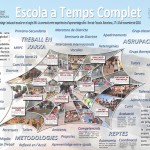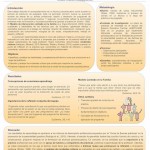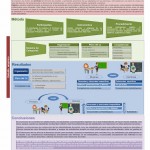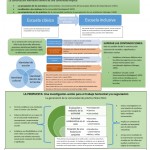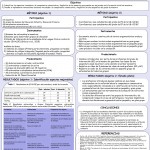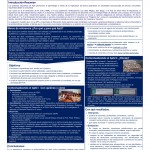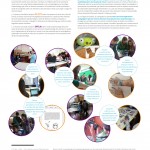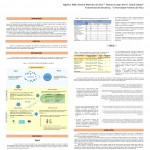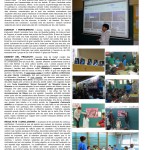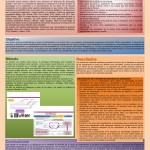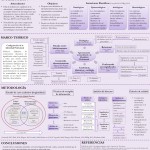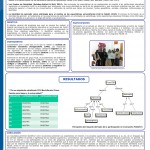Nowadays, we are living in difficult times in which the risk of inequality and social exclusion has increased. Times where people identities are challenged, and where new educational contexts outside the traditional socializing institutions have appeared. Migration, the media of computers and audiovisual era, the social networks, etc., have provided many learning opportunities, encouraging the creation of a new global village in which new activity contexts and practices have emerged, that required the mastery of new tools, skills and competencies. Something that characterizes these new set of activities, many of them arising from the use of information technologies, it is that learning is no longer localized (or not exclusively) on a single physical, temporal and institutional context, but produced in a diverse variety of activity contexts (whether physical or virtual) and throughout multiple educational agents. This new ecology of learning, where we are immersed in, raises the need for a model of distributed and interconnected education that is testing the resilience of traditional educational institutions, which must respond to the training of competent learners all along their lives and in different contexts of action.
In a complex world like this, identity becomes a major issue for countries, educational institutions and persons. Identity is built through the participation in particular settings in which we participate and the way we take advantage of the learning opportunities and resources offered by them. As several authors argue, learning and identity are closely related. Thus, identities in general and, in particular the learning identity, are understood as hybrid and border structures; and from our point of view, are the best tools to establish educational continuities among the different contexts in which we participate (educational contexts, school practices, community, friends, neighborhoods, social networks, and so on.).
It is through participation in different activities and educational contexts where people can build and rebuild their multiple identities. In this session we will discuss about the learner identity; a type of identity closely related to future achievements and failures on learning which is constantly in a rebuilding process, and that is constructed in relation with others. This interest involves analyzing the process by which people got to make sense of our participation in learning activities by recognizing ourselves as learners, and the values and emotions walk with this recognition. This implies also investigate related issues, such as how to manage these identities in the classroom, the adjustment of pedagogical interventions, the connection between the learning experiences inside and outside school, the redefinition of teacher and student roles in the new ecology of learning, and many others.
The purpose of this session, directed to teachers, researchers and other educational professionals, is to debate and share experiences (research and teaching innovation) that allow us working in order to promote educational continuities between the school and the learners, their families and their communities of reference. The ultimate goal is to support the construction of competent learners and the promotion of positive learning pathways that help them developing new learning identities and achieve their projects, both personal and professional. We will have 13 posters in this session, eight of them are research projects and five are innovation experiences. All of them are presented from different points of view, but articulated around some interests that can be shared and common to all them. Some posters are focused on revealing key factors to overcome discontinuities between the everyday practices of students and the formal educational practices in all educational levels. Other proposals are more focused on the problem of failure and dropout of some students and its relation to the construction of their identity as learners. And finally, we also have proposals related to the study of the processes of identity construction in the school and in higher education.
|
|
Artigal, R., Maura, A.M. i Pineda, R. (2016). Escola a Temps Complet.abstract – poster |
|
|
Cabrera, B. y Callejas, E. (2016). El proceso de cambio en el técnico psicoeducativo: la evolución del profesional novel hacia el Modelo Centrado en la Familia.abstract – poster |
|
|
Cubero, M., Santamaría, S., Prados, M. y Arias, S. (2016). La identidad profesional docente: cómo describen su yo profesional estudiantes de Educación Primaria e Infantil.abstract – poster
|
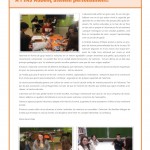
|
Farré, G. (2016). A l’INS Aubenç atenem personalment!abstract – poster |
|
|
García, D., Padrós, M., Sánchez, S. y Lalueza, J.L. (2016). Identidad escolar e identidad minoritaria. Contradicciones y herramientas para la construcción de una identidad intercultural.abstract – poster |
|
|
Gràcia, M., Jarque, M.J., Vega, F. y Bitencourt, D. (2016). La competencia comunicativa y lingüística oral y la construcción de la identidad en la formación inicial de maestros.abstract – poster |
|
|
Marco, M.J., Martínez, V. y Macías, B. (2016). Aprendizaje-servicio en el ámbito universitario. Adquisición de competencias y cambios identitarios.abstract – poster |
|
|
Onsès, J. i Miño, R. (2016). La documentació visual de l’aprenentatge dins i fora de l’aula.abstract – poster |
|
|
Pereira, A.M., Largo, M. e Saballa, D. (2016). Experiências de aprendizagem de estudantes universitários e a construção de significados sobre si mesmo como aprendiz.abstract – poster |
|
|
Porta, J., Gimó, X. i Carrillo, C. (2016). Parlant de tot “Pràctica sobre l´Expressió Oral”.abstract – poster |
|
|
Rosales, R. A. y Cubero, R. (2016). Identidad de aprendiz saludable y prácticas de aprendizaje cooperativo. Estudio en un contexto de riesgo de exclusión social.abstract – poster |
|
|
Solari, M. y Martín, E. (2016). Aprendiendo a ser orientadora: Una propuesta teórico-metodológica para investigar la construcción de la identidad profesional en contextos escolares.abstract – poster |
|
|
Subero, D. y Esteban-Guitart, M. (2016). La mejora las expectativas sobre la universidad y los estudios superiores en jóvenes en riesgo de exclusión social: El proyecto FICAB’15.abstract – poster |

